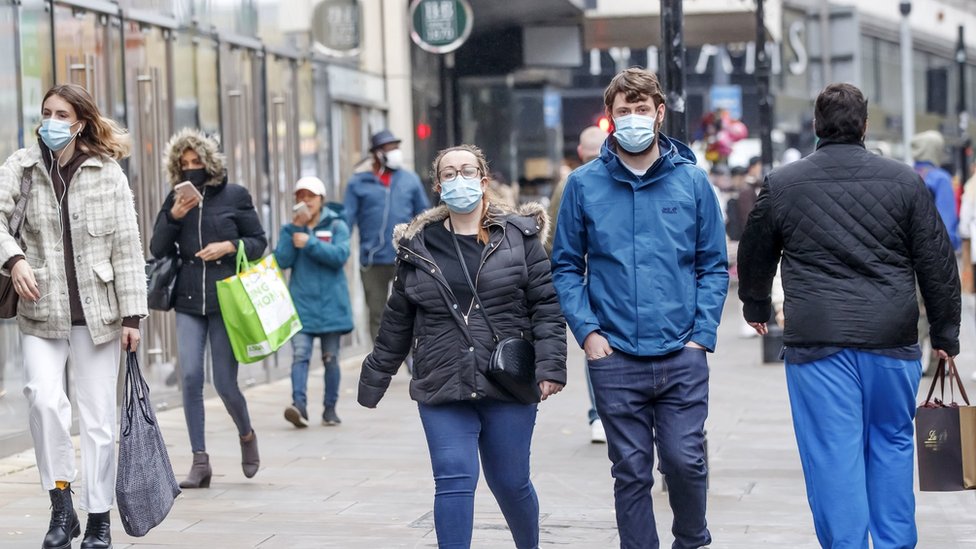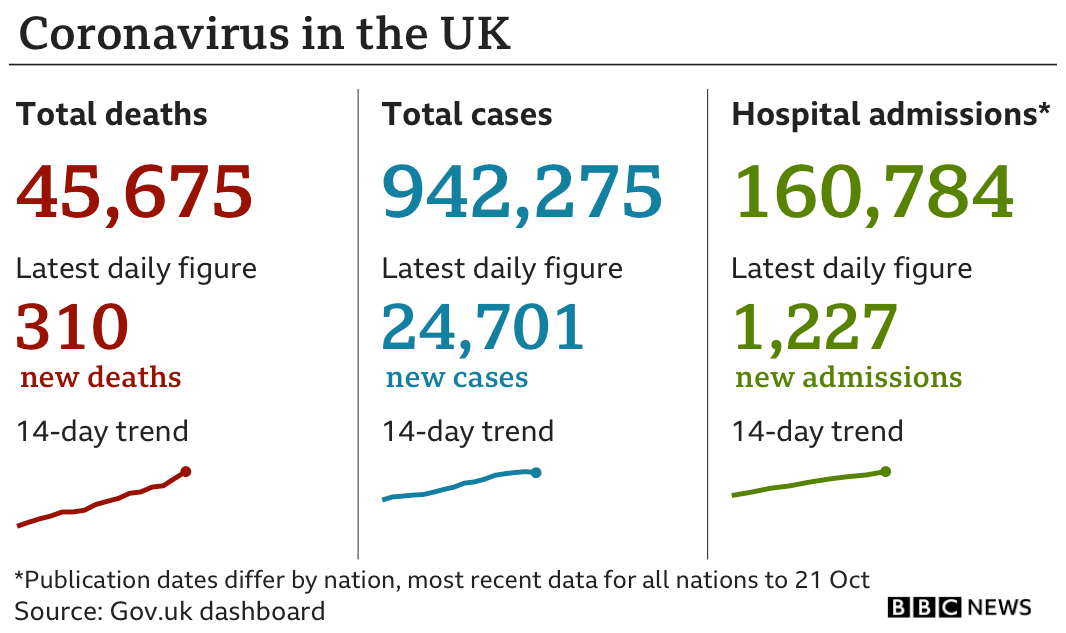Covid-19: Nearly 100,000 catching virus every day - study
By James Gallagher
Health and science correspondent
-
- Published

The study, by Imperial College London, says the pace of the epidemic is accelerating and estimates the number of people infected is now doubling every nine days.
The authors say we are at a "critical stage" and "something has to change".
Communities Secretary Robert Jenrick told BBC Breakfast the government wanted to "try to avoid having a national blanket approach" to coronavirus restrictions in England.
"We don't have a plan, today, to do a full national lockdown," he said, adding such a move "would be destructive to people's lives and livelihoods and broader health and wellbeing".
A national "firebreak" lockdown is ongoing in Wales, while Northern Ireland has tightened restrictions, including closing schools, and Scotland will later confirm details of a new tiered alert system.
Experts are warning that we are fast approaching the peak in infections seen in the spring.
The React-1 study is highly influential because it is the most up-to-date assessment of Covid-19 in the country, with the last swabs taken only on Sunday and nearly 86,000 volunteers taking part.
A further 24,701 new coronavirus cases were reported on Thursday - but the Imperial College study randomly tests asymptomatic people to estimate the number of overall new infections.
It shows cases are rising in every age group and in every region of England.
While cases are currently highest in the North, infections are surging more rapidly in the South.
The study compared the latest swabs collected between 16 and 25 October with the last round of swabs, between 18 September and 5 October.
It found that, on average, every infected person in London was passing on the virus to nearly three other people - the highest estimated rate in England.
And it also suggests:
- The number of people infected has more than doubled since the last round, with one in every 78 people now testing positive.
- The hardest hit area is Yorkshire and the Humber, where one in every 37 people has the virus, followed by the North West region.
- Three times as many people aged 55-64 are infected, compared with the previous month's study, and twice as many over 65s.
- The pace of the epidemic has accelerated with the R number - the number of people each infected person passes the virus on to on average - increasing from 1.15 to 1.56.
- Overall, the number of people infected is doubling every nine days.
- The South East, South West, east of England and London all have an R above 2.0.
- Cases are spiking in young people in the South West in a repeat of the pattern seen in northern England just over a month ago.
- There are 96,000 people catching the virus every day.

Prof Steven Riley, one of the authors, told BBC Radio 4's Today programme the government may need to "think about changing the approach" in England.
"I think lockdown as a phrase is inhibiting us a little bit," he said. "I think what our study shows is there would be genuine benefits to some kind of national policy in that we could prevent the pattern in the South turning into the current pattern in the North and bring about a reversal in the North as quickly as possible."
He added that "sooner is better" when it comes to making a decision on national restrictions.
Dr Mike Tildesley, professor of infectious disease modelling at the University of Warwick and adviser to the government, told Today there needed to be "urgent... rapid action" to avoid a further rise in infections next month.
He described the current regional approach as "firefighting" and said some form of national measure in England would help prevent areas moving up into higher restrictions.
"If we don't take urgent action, we're most likely to see that as we're approaching the festive period we're probably going to be in at least tier two pretty much everywhere in the country," he said.
But World Health Organization envoy Prof David Nabarro said regional restrictions in the North have slowed the spread of Covid-19.
He said England has "apparently been able to slow the spread in some parts of the North of the country through very effective local action".

Analysis: Stark picture of a challenging winter
This study paints a stark picture of where we are and where we could be heading.
If there was no change in the reported nine-day doubling time, there would be more than a million infections a day by the end of November.
That is a considerable "if", but it demonstrates the threat posed by the virus if it is allowed to grow exponentially.
Somehow, we have to navigate a challenging winter, balancing the virus and the cost of restrictions.
France and Germany have turned to forms of lockdown, albeit not as severe as those endured earlier in the year. The government here is sticking to its regional strategy.
But the hardest fact to digest today may be that it is still only October.
Spring, when hopefully the weather and vaccine will make the virus easier to control, is still a long way away.

Prof Paul Elliott, another report author, said "we're at a critical period in the second wave" and that higher cases "will lead to more hospitalisations and loss of life".
He said we have to cut the number of people we interact with to curb the spread of the virus.
The government is still hoping its local, targeted restrictions will work, allowing more of the economy to stay open in areas where the virus is less prevalent, according to BBC political correspondent Nick Eardley.
But it has also been at pains to say it is ruling nothing out if the virus is out of control - including nationwide measures, he added.

It comes after the environment secretary said "it's too early to say" what Covid rules will be in place by Christmas.
George Eustice warned people "may not be able to get together in the larger groups that they normally would".
The government's coronavirus dashboard reported 310 further deaths across the UK on Wednesday.
But there were glimmers of hope in the report. Cases in the north east of England are still growing, but much more slowly than before.
And in the North East and Yorkshire and the Humber, the number of 18-24 year olds catching the virus is starting to fall, although it is rising in older age groups.

- THREE TIERS: How will the system work?
- SOCIAL DISTANCING: Can I give my friends a hug?
- LOOK-UP TOOL: How many cases in your area?

Commenting on the data, Prof Paul Hunter from the University of East Anglia told BBC News: "It's going to be a really difficult winter."
"Even if we're not there now, we'll have surpassed the peak in a week or two unless some miracle happens, but I'm not betting on it," he said.
"The death rate, though, is substantially lower than it was as more young people are affected and we have better treatments."
Prof Igor Rudan, from the University of Edinburgh, said the React-1 study should be considered "very accurate and reliable scientific evidence that shows that a very large second wave" is under way.
"It will inevitably lead to a very large number of infections, severe episodes and deaths in the coming weeks and months," he said.

- HALLOWEEN AT HOME?: Four frighteningly good ways to get involved this year
- BBC IPLAYER EXCLUSIVE: Would you like a sneak peek at the new series of His Dark Materials?


How have you been affected by the issues in this story? Share your experiences by emailing haveyoursay@bbc.co.uk.
Please include a contact number if you are willing to speak to a BBC journalist. You can also get in touch in the following ways:
- WhatsApp: +44 7756 165803
- Tweet: @BBC_HaveYourSay
- Please read our terms & conditions and privacy policy
If you are reading this page and can't see the form you will need to visit the mobile version of the BBC website to submit your question or comment or you can email us at HaveYourSay@bbc.co.uk. Please include your name, age and location with any submission.
"day" - Google News
October 29, 2020 at 03:50PM
https://ift.tt/34CqzDZ
Covid-19: Nearly 100,000 catching virus every day - study - BBC News
"day" - Google News
https://ift.tt/3f7h3fo
https://ift.tt/2VYSiKW
Bagikan Berita Ini














0 Response to "Covid-19: Nearly 100,000 catching virus every day - study - BBC News"
Post a Comment